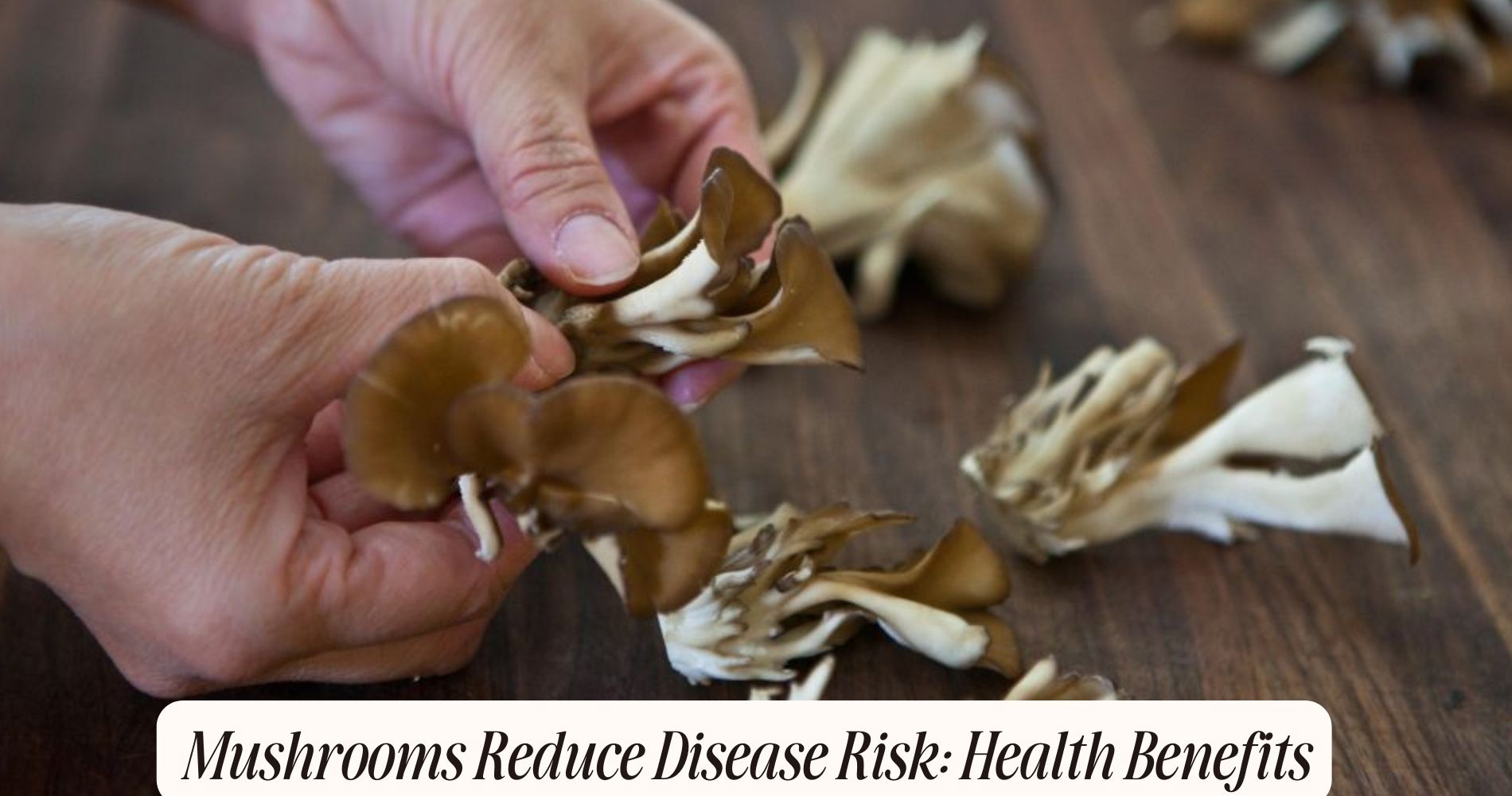
Mushrooms Reduce Disease Risk: Health Benefits
Nutrient-Rich Superfood
Mushrooms are packed with essential vitamins, minerals, and antioxidants that support overall health and reduce the risk of chronic diseases.
They're an excellent source of B vitamins, including riboflavin, niacin, and pantothenic acid, which help maintain healthy skin, improve digestion, and support brain function. Additionally, mushrooms provide important minerals like selenium, copper, and potassium, each playing a significant role in immune function, cardiovascular health, and cellular repair.
The culinary versatility of mushrooms makes them easy to incorporate into various dishes, from salads and soups to stir-fries and pasta. Their umami flavor enhances both vegetarian and meat-based meals, adding depth without extra calories or unhealthy fats.
Moreover, mushrooms contribute to sustainable farming practices. They can be grown using agricultural waste products, reducing environmental impact and promoting resource efficiency. Their growth requires less water and space compared to traditional crops, making them a sustainable choice for eco-conscious consumers.
Immune System Boost
In addition to their nutritional benefits, incorporating mushrooms into your diet can greatly enhance your immune system's effectiveness. Different mushroom varieties, such as shiitake, maitake, and reishi, have been shown to boost immune response. These mushrooms are rich in beta-glucans, complex sugars that stimulate the activity of your immune cells, enhancing their ability to fight off infections.
Shiitake mushrooms, for instance, contain lentinan, a compound that has been found to increase the production of white blood cells, vital for warding off pathogens.

Maitake mushrooms are another powerhouse, known for their ability to activate macrophages, the cells responsible for detecting and destroying bacteria and viruses.
Reishi mushrooms, often referred to as the “mushroom of immortality”, contain triterpenoids and polysaccharides, which support immune modulation, helping to maintain a balanced immune response.
Scientific studies have demonstrated that regular consumption of these mushroom varieties can lead to a more robust and responsive immune system.
By adding a variety of mushrooms to your meals, you're not only enjoying their unique flavors but also fortifying your body's natural defenses.
Anti-Inflammatory Properties
You'll find that certain mushroom varieties possess potent anti-inflammatory properties, which can play an essential role in reducing chronic inflammation and promoting overall health. For instance, shiitake, reishi, and maitake mushrooms are known for their ability to modulate the body's inflammatory response. These mushrooms contain bioactive compounds such as polysaccharides, terpenoids, and phenolic acids, which are integral to their anti-inflammatory mechanisms.

Polysaccharides, particularly beta-glucans, are effective in modulating immune responses and reducing inflammation. They achieve this by inhibiting the production of pro-inflammatory cytokines, which are signaling molecules that exacerbate inflammation.
Terpenoids, another group of compounds found in these mushroom varieties, also exhibit strong anti-inflammatory properties by suppressing the activity of enzymes like cyclooxygenase (COX) that are involved in the inflammatory process.
Furthermore, phenolic acids have antioxidant properties that help neutralize free radicals, thereby reducing oxidative stress and subsequent inflammation. By incorporating these mushrooms into your diet, you can take advantage of their nutrient-dense profiles and anti-inflammatory benefits.
Ultimately, regular consumption of these mushrooms can considerably contribute to managing chronic inflammatory conditions and enhancing your overall well-being.
Cancer-Fighting Compounds
Harnessing the power of certain mushrooms can significantly aid in the fight against cancer, thanks to their unique bioactive compounds that target cancerous cells and inhibit tumor growth. Various mushroom varieties, such as shiitake, reishi, and maitake, have been extensively studied for their anti-cancer properties. These mushrooms contain polysaccharides, particularly beta-glucans, which enhance your immune system's ability to detect and destroy cancer cells.

Cancer research has highlighted that beta-glucans activate the immune response, promoting the activity of natural killer cells and T-cells, which are essential for targeting malignant cells. Additionally, compounds like lentinan (found in shiitake mushrooms) have demonstrated the ability to slow tumor progression and improve survival rates in patients undergoing conventional cancer treatments.
Reishi mushrooms, rich in triterpenoids, offer another layer of protection by inducing apoptosis (programmed cell death) in cancer cells while sparing healthy tissues. Maitake mushrooms also contain D-fraction, known for its tumor-inhibiting effects and capacity to enhance the efficacy of chemotherapy.
Incorporating these mushroom varieties into your diet could provide a potent, natural defense against cancer, complementing traditional therapies and bolstering your overall health.
Heart Health Benefits
You'll find that incorporating mushrooms into your diet can greatly improve heart health.
They help lower cholesterol levels, regulate blood pressure, and provide powerful antioxidants.
These combined benefits make mushrooms a nutrient-dense option for maintaining cardiovascular wellness.
Cholesterol Reduction
Eating mushrooms regularly can greatly lower your cholesterol levels, which is essential for maintaining heart health. Mushrooms contain compounds like beta-glucans and eritadenine that have a significant cholesterol impact. These bioactive substances help reduce levels of LDL cholesterol, often referred to as 'bad' cholesterol, while potentially increasing HDL cholesterol, the 'good' cholesterol.
Including mushrooms in your diet provides a nutrient-dense, low-calorie option among dietary sources that support cardiovascular health. Various studies have shown that the fiber and antioxidants in mushrooms not only help in cholesterol reduction but also combat oxidative stress and inflammation, both of which are risk factors for heart disease.
Moreover, mushrooms are rich in sterols, which act similarly to cholesterol but don't get absorbed in the bloodstream. This competition helps lower blood cholesterol levels.
By incorporating mushrooms into your diet, you can benefit from these cholesterol-lowering properties without adding excess calories or unhealthy fats. For instance, adding a handful of mushrooms to your salads, soups, or stir-fries can make a substantial difference in your heart health over time.
Ultimately, making mushrooms a staple in your meals is a simple yet effective strategy for supporting your cardiovascular system.
Blood Pressure Regulation
Incorporating mushrooms into your diet can considerably help regulate blood pressure, contributing to overall heart health. Various mushroom varieties, such as shiitake, maitake, and white button, are rich in essential nutrients like potassium. Potassium helps balance sodium levels in your body, which is vital for maintaining ideal blood pressure.

Hypertension studies have shown that mushrooms contain bioactive compounds that assist in dilating blood vessels, improving blood flow, and reducing the strain on your heart. For example, ergothioneine, an antioxidant found in many mushroom varieties, has been linked to improved endothelial function, a key factor in regulating blood pressure.
Moreover, research indicates that mushrooms are a good source of vitamin D, which plays a role in cardiovascular health. Inadequate vitamin D levels are often associated with hypertension, making mushrooms a valuable addition to your diet for this reason as well.
Including mushrooms in your meals can be a simple, tasty way to leverage their heart health benefits. Whether you add them to salads, soups, or stir-fries, these versatile fungi can be a powerful ally in the fight against hypertension.
Antioxidant Properties
Mushrooms are packed with antioxidants like ergothioneine and glutathione, which can greatly bolster heart health by reducing oxidative stress and inflammation.
Oxidative stress is a key factor in the development of cardiovascular diseases, and by consuming mushrooms, you can help alleviate this risk. Studies have shown that these antioxidants protect cells from damage, promote better blood vessel function, and reduce the risk of plaque build-up in arteries.
Different mushroom varieties, such as shiitake, maitake, and reishi, offer varying levels of these potent antioxidants. Including a mix of these varieties in your diet guarantees you get a broad spectrum of heart-protective benefits.
Your cooking methods also matter; for instance, grilling or roasting mushrooms can preserve their antioxidant content better than boiling or frying.
Incorporating mushrooms into your meals doesn't just enhance flavor—it's a strategic move for heart health. Whether you're adding them to salads, soups, or stir-fries, these fungi offer a nutrient-dense way to support your cardiovascular system.
Diabetes Management
In managing diabetes, mushrooms can play an essential role by helping regulate blood sugar levels.
They're packed with antioxidants that combat oxidative stress, a key factor in diabetes complications.
Additionally, their nutrient-rich profile supports overall metabolic health, making them a smart dietary choice for those with diabetes.
Blood Sugar Regulation
Consuming mushrooms regularly can help regulate blood sugar levels, making them a valuable addition to diabetes management plans. Different mushroom varieties, such as shiitake, maitake, and oyster mushrooms, have been shown to have a low glycemic index. This means they cause a slower, more gradual increase in blood sugar levels compared to higher glycemic index foods. This property makes mushrooms particularly beneficial for those looking to manage or prevent diabetes.
Mushrooms are rich in fiber, which slows down carbohydrate absorption and helps maintain stable blood sugar levels. They also contain compounds such as polysaccharides that have been found to enhance insulin sensitivity. Improved insulin sensitivity means your body can use insulin more effectively, which is essential for blood sugar regulation.

Furthermore, mushrooms are low in calories and high in essential nutrients, including vitamins B and D, selenium, and potassium. These nutrients support overall health and metabolic function, contributing to better blood sugar control. Including a variety of mushrooms in your diet can provide you with these benefits, making it easier to manage diabetes and improve your overall well-being.
Antioxidant Properties
Given their potent antioxidant properties, various mushroom species can play a significant role in managing oxidative stress associated with diabetes. Antioxidants help neutralize free radicals, which are unstable molecules that can damage cells and contribute to chronic diseases like diabetes.
By incorporating mushroom varieties such as shiitake, maitake, and reishi into your diet, you can bolster your antioxidant intake and potentially reduce diabetes-related complications.
Research indicates that these mushrooms contain high levels of ergothioneine and glutathione, two powerful antioxidants. Ergothioneine, in particular, has been shown to protect cells from oxidative damage, which is essential for individuals managing diabetes.
Different cooking methods can affect the antioxidant levels in mushrooms. For instance, sautéing mushrooms preserves more of their antioxidant compounds compared to boiling or frying.
Including mushrooms in your diet doesn't just add flavor but also boosts your overall health by enhancing your body's ability to fight oxidative stress. By choosing the right mushroom varieties and cooking methods, you can maximize the health benefits and support your diabetes management efforts effectively.
This nutrient-dense approach can make a meaningful difference in your daily health regimen.
Nutrient-Rich Profile
Beyond their antioxidant properties, mushrooms offer a nutrient-rich profile that can be highly beneficial for diabetes management. Rich in fiber, mushrooms help regulate blood sugar levels by slowing the absorption of glucose. This is particularly beneficial for type 2 diabetes patients.
Additionally, mushrooms are low in calories and carbohydrates, making them an ideal food choice for maintaining a balanced diet.
Different mushroom varieties, such as shiitake, portobello, and oyster mushrooms, are packed with essential nutrients like B vitamins, selenium, and potassium. These nutrients play a significant role in metabolic processes and overall health. For instance, B vitamins are important for energy metabolism, which can be particularly useful for those managing diabetes.
Incorporating mushrooms into your daily meals is easy due to their versatile culinary uses. You can add them to salads, stir-fries, or soups, or even use them as a meat substitute in various dishes. Their umami flavor enhances the taste of your food without adding extra calories, making it easier to stick to a diabetes-friendly diet.
Gut Health Improvement
How exactly do mushrooms contribute to gut health improvement? It turns out, mushrooms are packed with prebiotic fibers like beta-glucans and chitin. These fibers play a vital role in nourishing the beneficial bacteria in your gut. When your gut flora thrives, it aids in better digestion and boosts your immune system. Prebiotic fibers act as food for these good bacteria, helping them flourish and outcompete harmful microbes.
Mushrooms also contain digestive enzymes that aid in breaking down complex carbohydrates, proteins, and fats. This enzymatic activity guarantees that nutrients are more efficiently absorbed in your intestines, reducing bloating and discomfort. By promoting a balanced gut microbiome and enhancing nutrient absorption, mushrooms can greatly improve your digestive health.
Research shows that a healthy gut is linked to overall wellness, affecting everything from your mood to your immune response. Including mushrooms in your diet can be a simple, natural way to support a diverse and healthy gut microbiome.
Antioxidant Powerhouses
Mushrooms are packed with powerful antioxidants like ergothioneine and glutathione, which help protect your cells from oxidative stress and reduce the risk of chronic diseases. These antioxidants play an essential role in neutralizing free radicals, molecules that can damage cells and contribute to conditions like heart disease, cancer, and Alzheimer's.
Different mushroom varieties offer varying levels of these antioxidants. For instance, shiitake and maitake mushrooms are particularly rich in ergothioneine, while white button mushrooms contain significant amounts of glutathione. By incorporating a variety of mushrooms into your diet, you can maximize your intake of these beneficial compounds.

Cooking methods can also impact the antioxidant levels in mushrooms. Studies suggest that grilling or microwaving mushrooms helps retain their antioxidant properties better than boiling or frying. So, next time you're preparing a meal, consider these methods to preserve their health benefits.
Elevate Your Health with SUPER MUSHROOM GUMMIES
While exploring the health benefits of mushrooms and their ability to reduce disease risk, consider incorporating Well Gummies' SUPER MUSHROOM GUMMIES into your daily routine. This convenient gum chew product is packed with 10 types of functional mushrooms. Our vegan gummies fuel your brain and energize your body naturally, providing calmer energy, sharper focus, and immune support for a balanced body and clear mind.
Enjoy the delicious taste of fresh wild berries—just like your favorite candy, but without the jitters or crash. Shine all day with the natural benefits of SUPER MUSHROOM GUMMIES and support your health effortlessly.
Frequently Asked Questions
Can Mushrooms Be Eaten Raw or Should They Always Be Cooked?
You can eat raw mushrooms, but cooking methods like sautéing enhance their nutrient absorption and reduce potential toxins. Cooking mushrooms also boosts their antioxidant levels, making them even more beneficial for your health.
Are There Any Potential Side Effects of Consuming Mushrooms Regularly?
When consuming mushrooms regularly, you might experience potential side effects like allergic reactions or gastrointestinal issues. It's crucial to monitor your body's response and consult a healthcare professional if you notice any adverse symptoms.
How Can I Incorporate More Mushrooms Into My Daily Diet?
You can incorporate more mushrooms into your diet by trying diverse mushroom recipes and exploring different mushroom varieties like shiitake, portobello, and cremini. These nutrient-dense options offer versatile, health-focused additions to your meals.
Are All Mushroom Varieties Equally Beneficial for Health?
Not all mushroom varieties offer the same health benefits. Different mushrooms contain varying nutrient profiles and bioactive compounds. Research various types to understand their specific health differences, and choose nutrient-dense options for maximum benefits.
Do Mushrooms Lose Their Nutritional Value When Dried or Processed?
Yes, mushrooms can lose some nutrients when dried or processed, but it depends on the drying methods. Freeze-drying retains more nutrient retention compared to air-drying, making it a healthier option for preserving mushrooms.
Conclusion
Incorporating mushrooms into your diet can greatly improve your health.
They're nutrient-rich superfoods that boost your immune system, reduce inflammation, and even contain cancer-fighting compounds.
Mushrooms contribute to heart health, aid in diabetes management, and promote gut health, thanks to their powerful antioxidants.
By adding these versatile fungi to your meals, you're making a proactive choice toward better overall health.
Don't underestimate the small but mighty mushroom—your body will thank you.




